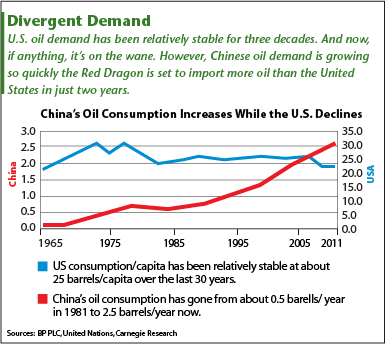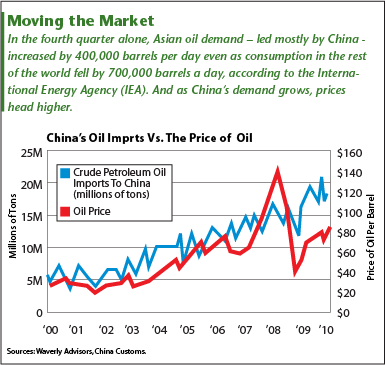Why Energy Investors Will Get Crushed If They Fail to Look Towards Dubai
Commodities / Crude Oil Jan 26, 2012 - 06:18 AM GMTBy: Money_Morning
 Keith Fitz-Gerald writes:
The way I see it, U.S. and European energy traders will be lucky if the door doesn't hit them in the backsides as everybody heads for the doors.
Keith Fitz-Gerald writes:
The way I see it, U.S. and European energy traders will be lucky if the door doesn't hit them in the backsides as everybody heads for the doors.
Like so many Western investors, they still have their blinders on.
They think that if demand in the U.S. and the European Union (EU) begins to slide that oil prices will fall into the toilet right along with it.
But what they don't see is that Asian oil demand is what actually "drives" the global oil market.
This is why today's investors need to adopt an energy investment strategy focused on what is happening on the other side of the Pacific.
Because what happens there is critical to higher prices and profits here.
Here's why.
First, consider Asian demand.
In the fourth quarter alone, Asian demand increased by 400,000 barrels per day even as consumption in the rest of the world fell by 700,000 barrels a day, according to the International Energy Agency (IEA).
Meanwhile, Chinese demand in particular is so strong that the Red Dragon is set to import more oil than the United States within two years, according to my projections.
And don't take my word for it. Goldman Sachs Group Inc. (NYSE: GS) thinks the U.S. will be overtaken by China this year, while the IEA believes it will happen in 2020.
I think that's splitting hairs frankly.
What matters is that Asian oil demand growth is likely to represent a staggering 70% of the world's total oil demand growth this year. Or more depending on which studies you believe.
As China Rises the World Shifts Toward Dubai
 Second, consider the effect Asia has on how oil is priced.
Second, consider the effect Asia has on how oil is priced.
U.S. investors have focused on U.S. and Brent oil prices for years, and with good reason. North American markets have been the largest in terms of both consumption and growth.
Now, however, Asia's demand growth of more than 720,000 barrels per day dwarfs our own.
By comparison, U.S. demand growth is only 310,000 barrels per day while Europe's demand growth is positively anemic at only 260,000 barrels per day, according to the IEA.
That means Dubai's Mercantile Exchange is rapidly becoming the new pricing standard -quickly displacing the traditional Brent.
That's where countries like China, Japan, Indonesia, Vietnam and others in the Asian Rim increasingly price their oil for delivery.
Sadly, most investors can't even find Dubai on a map, but they'd better learn in a hurry.
Today, the differential between Dubai crude and Brent crude is dropping quickly, and now stands at a 14-month low of $2.73 a barrel, according to the Financial Times. Last April the spread on the Dubai crude was 237% higher at $7.61 a barrel.
Critics note that this is because Dubai crude is of lower quality and the Libyan revolution left world markets without sweet crude.
True, but they're missing the point - Asian demand is shifting commodity pricing from London, New York and Chicago to Dubai, and even Shanghai, where traders believe it more accurately reflects regional pricing influences.
And as China's demand grows, prices head higher.
Emerging Markets: As Simple as Supply and Demand
 Third, consider infrastructure development in the emerging markets.
Third, consider infrastructure development in the emerging markets.
China and India are both constructing new refineries estimated to have more than 1 million barrels a day of processing capacity between them.
Admittedly, bringing an additional 1 million barrels a day of production capacity on line doesn't sound like a lot in the scheme of things, especially when we've become numb to trillion-dollar deficits and bailouts. But think again.
The world consumes approximately 89.5 million barrels a day yet has production capacity of only 90 million barrels a day give or take.
This means the amount of production capacity being brought on line exceeds total current global excess production. It also means that the placement of that new capacity - in China and India - is likely to have a significant impact on global pricing.
Think about it. Supply and demand determines prices. It's one of the most basic of all economic principles.
If demand increases or there is a disruption in supply, there is upward pricing pressure. If demand falls relative to supply, prices drop.
By the same measure, if there is a limited supply and growing demand coupled with new capacity, pricing power shifts from markets where demand has dropped to markets where demand is rising.
You see this in your own neighborhood on a much smaller scale already.
If there are two service stations in town and a third one is built, customers start buying from the third station... particularly if it's closer to where they live, has more attractive prices, better gas, or is closer to the refineries servicing it.
Initially prices will drop in response to increased competition. But, over time, as the new entrant disrupts the existing supply and demand balance, prices actually tend to rise, particularly if the three service stations now have to fight over the same limited number of tankers serving the community.
Then there is the process of demand building to consider. New capacity arguably facilitates demand growth.
I think that's a battle that's already begun.
Take the Chinese government, for example. Beijing is likely to use its newly built refinery capacity to boost strategic reserves.
Many people believe this will be a function of China's growing military demand, but China's growing transport sector is far more important because it moves the goods needed by 1.3 billion people to market.
So they'll buy as much oil as it takes to prevent a revolution...even if it means we don't have any left to buy (except at exorbitantly high prices). This is why Chinese oil companies have been buying up oil assets anywhere they can get their hands them.
They know it's an issue of domestic survival rather than global domination, as the West prefers to think about their action.
At the same time, the so-called Arab Spring has interrupted the capital investments needed to maintain current oil production, shipping, and pricing levels.
This is significant because oil markets cannot function without constant capital improvement and investment, at least not at current prices.
Factor in the vulnerable oil transportation routes in the Gulf, the Malacca Straits and one can easily envision $150-$200 a barrel in risk premiums alone if things heat up...even without open hostilities.
More if the shooting starts.
How to Play the Global Shift from West to East
So now what?
No doubt the United States Oil Fund (NYSE: USO) and the United States Brent Oil Fund (NYSE: BNO), long the domain of both groups of traders will remain viable investments, but it's important to understand they're not the leaders they once were.
The same can be said for the big oil companies like Exxon Mobil (NYSE: XOM), Royal Dutch Shell PLC (NYSE ADR: RDS.A, RDS.B) and even the vilified BP PLC (NYSE ADR: BP).
I think the far more interesting and potentially profitable game lies directly in Chinese oil companies like Sinopec (NYSE ADR: SHI), PetroChina (NYSE ADR: PTR) and CNOOC Ltd. (NYSE ADR: CEO). Not only do these companies have the global reach needed to capitalize on the demand shift, but they've got the cash, too.
I also tend to favor companies like Halliburton Co. (NYSE: HAL), which provide plenty of services to foreign oil companies and oil service providers. Not only are they quite literally in the middle of everything, but many times services companies like Halliburton can work for several competitors at once, further expanding their coffers and their earnings.
And finally, I think the Middle East's markets are incredibly beaten down and, next to the Chinese markets, probably the most hated on the planet at the moment.
That potentially makes financial and property-heavy choices like the Market Vector Gulf States (NYSE: MES) appealing because all that oil money has to flow somewhere.
Eventually.
Either way, it's time for western oil investors to take the blinders off.
Source http://moneymorning.com/2012/01/26/why-energy-investors-will-get-crushed-if-they-fail-to-look-towards-dubai/
Money Morning/The Money Map Report
©2012 Monument Street Publishing. All Rights Reserved. Protected by copyright laws of the United States and international treaties. Any reproduction, copying, or redistribution (electronic or otherwise, including on the world wide web), of content from this website, in whole or in part, is strictly prohibited without the express written permission of Monument Street Publishing. 105 West Monument Street, Baltimore MD 21201, Email: customerservice@moneymorning.com
Disclaimer: Nothing published by Money Morning should be considered personalized investment advice. Although our employees may answer your general customer service questions, they are not licensed under securities laws to address your particular investment situation. No communication by our employees to you should be deemed as personalized investent advice. We expressly forbid our writers from having a financial interest in any security recommended to our readers. All of our employees and agents must wait 24 hours after on-line publication, or after the mailing of printed-only publication prior to following an initial recommendation. Any investments recommended by Money Morning should be made only after consulting with your investment advisor and only after reviewing the prospectus or financial statements of the company.
Money Morning Archive |
© 2005-2022 http://www.MarketOracle.co.uk - The Market Oracle is a FREE Daily Financial Markets Analysis & Forecasting online publication.



